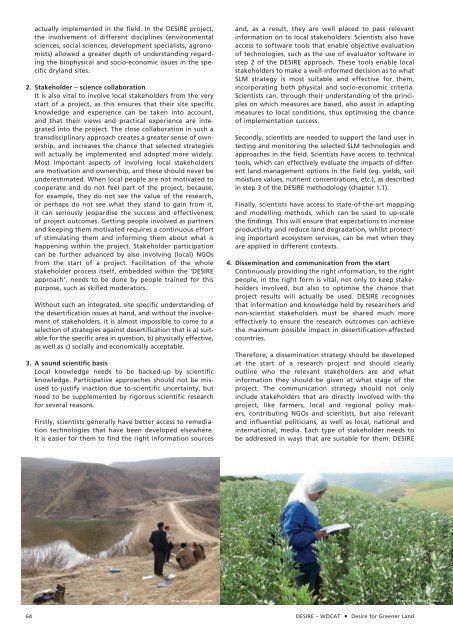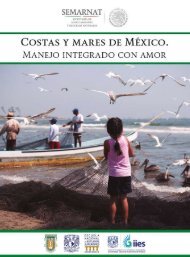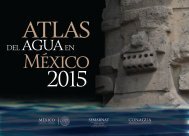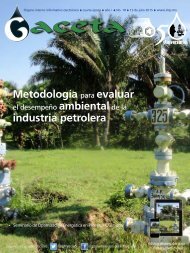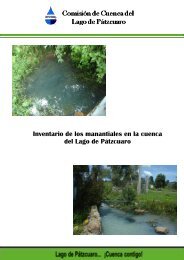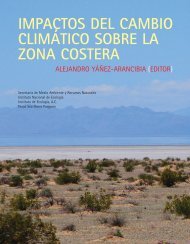Desire for Greener Land
Desire for Greener Land
Desire for Greener Land
Create successful ePaper yourself
Turn your PDF publications into a flip-book with our unique Google optimized e-Paper software.
actually implemented in the field. In the DESIRE project,<br />
the involvement of different disciplines (environmental<br />
sciences, social sciences, development specialists, agronomists)<br />
allowed a greater depth of understanding regarding<br />
the biophysical and socio-economic issues in the specific<br />
dryland sites.<br />
2. Stakeholder – science collaboration<br />
It is also vital to involve local stakeholders from the very<br />
start of a project, as this ensures that their site specific<br />
knowledge and experience can be taken into account,<br />
and that their views and practical experience are integrated<br />
into the project. The close collaboration in such a<br />
transdisciplinary approach creates a greater sense of ownership,<br />
and increases the chance that selected strategies<br />
will actually be implemented and adopted more widely.<br />
Most important aspects of involving local stakeholders<br />
are motivation and ownership, and these should never be<br />
underestimated. When local people are not motivated to<br />
cooperate and do not feel part of the project, because,<br />
<strong>for</strong> example, they do not see the value of the research,<br />
or perhaps do not see what they stand to gain from it,<br />
it can seriously jeopardise the success and effectiveness<br />
of project outcomes. Getting people involved as partners<br />
and keeping them motivated requires a continuous ef<strong>for</strong>t<br />
of stimulating them and in<strong>for</strong>ming them about what is<br />
happening within the project. Stakeholder participation<br />
can be further advanced by also involving (local) NGOs<br />
from the start of a project. Facilitation of the whole<br />
stakeholder process itself, embedded within the ‘DESIRE<br />
approach’, needs to be done by people trained <strong>for</strong> this<br />
purpose, such as skilled moderators.<br />
Without such an integrated, site specific understanding of<br />
the desertification issues at hand, and without the involvement<br />
of stakeholders, it is almost impossible to come to a<br />
selection of strategies against desertification that is a) suitable<br />
<strong>for</strong> the specific area in question, b) physically effective,<br />
as well as c) socially and economically acceptable.<br />
3. A sound scientific basis<br />
Local knowledge needs to be backed-up by scientific<br />
knowledge. Participative approaches should not be misused<br />
to justify inaction due to scientific uncertainty, but<br />
need to be supplemented by rigorous scientific research<br />
<strong>for</strong> several reasons.<br />
Firstly, scientists generally have better access to remediation<br />
technologies that have been developed elsewhere.<br />
It is easier <strong>for</strong> them to find the right in<strong>for</strong>mation sources<br />
and, as a result, they are well placed to pass relevant<br />
in<strong>for</strong>mation on to local stakeholders. Scientists also have<br />
access to software tools that enable objective evaluation<br />
of technologies, such as the use of evaluator software in<br />
step 2 of the DESIRE approach. These tools enable local<br />
stakeholders to make a well-in<strong>for</strong>med decision as to what<br />
SLM strategy is most suitable and effective <strong>for</strong> them,<br />
incorporating both physical and socio-economic criteria.<br />
Scientists can, through their understanding of the principles<br />
on which measures are based, also assist in adapting<br />
measures to local conditions, thus optimising the chance<br />
of implementation success.<br />
Secondly, scientists are needed to support the land user in<br />
testing and monitoring the selected SLM technologies and<br />
approaches in the field. Scientists have access to technical<br />
tools, which can effectively evaluate the impacts of different<br />
land management options in the field (eg. yields, soil<br />
moisture values, nutrient concentrations, etc.), as described<br />
in step 3 of the DESIRE methodology (chapter 1.1).<br />
Finally, scientists have access to state-of-the-art mapping<br />
and modelling methods, which can be used to up-scale<br />
the findings. This will ensure that expectations to increase<br />
productivity and reduce land degradation, whilst protecting<br />
important ecosystem services, can be met when they<br />
are applied in different contexts.<br />
4. Dissemination and communication from the start<br />
Continuously providing the right in<strong>for</strong>mation, to the right<br />
people, in the right <strong>for</strong>m is vital, not only to keep stakeholders<br />
involved, but also to optimise the chance that<br />
project results will actually be used. DESIRE recognises<br />
that in<strong>for</strong>mation and knowledge held by researchers and<br />
non-scientist stakeholders must be shared much more<br />
effectively to ensure the research outcomes can achieve<br />
the maximum possible impact in desertification-affected<br />
countries.<br />
There<strong>for</strong>e, a dissemination strategy should be developed<br />
at the start of a research project and should clearly<br />
outline who the relevant stakeholders are and what<br />
in<strong>for</strong>mation they should be given at what stage of the<br />
project. The communication strategy should not only<br />
include stakeholders that are directly involved with the<br />
project, like farmers, local and regional policy makers,<br />
contributing NGOs and scientists, but also relevant<br />
and influential politicians, as well as local, national and<br />
international, media. Each type of stakeholder needs to<br />
be addressed in ways that are suitable <strong>for</strong> them. DESIRE<br />
China, Hanspeter Liniger Morocco, Gudrun Schwilch<br />
64 DESIRE – WOCAT <strong>Desire</strong> <strong>for</strong> <strong>Greener</strong> <strong>Land</strong>


